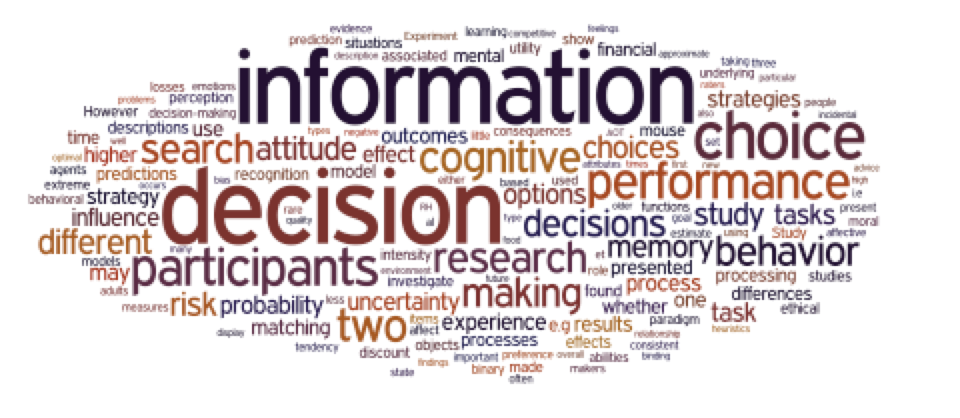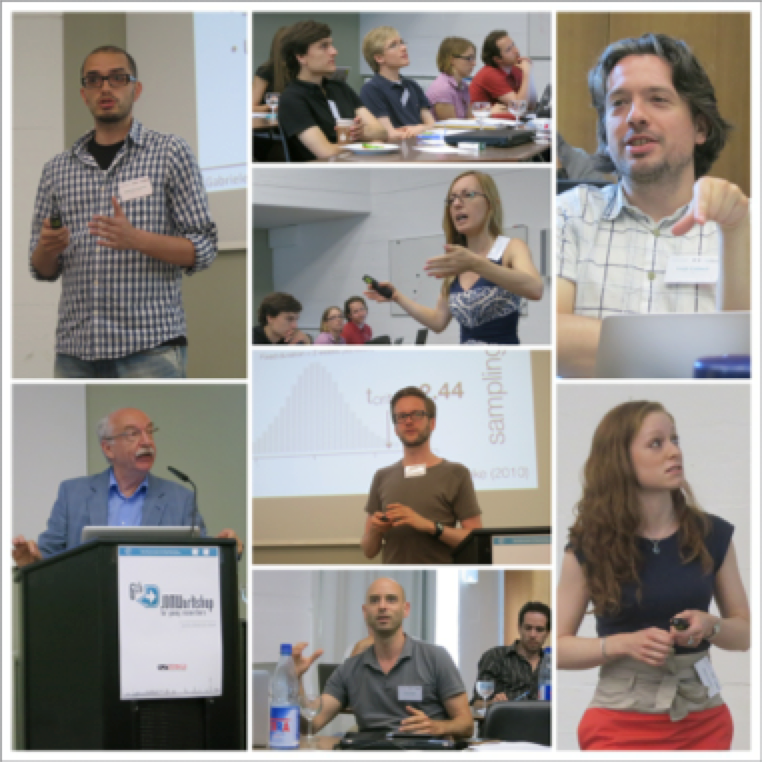The 6th JDM workshop for young researchers was held at the Max Planck Institute for Human Development in Berlin from July 17th to the 19th!
The workshop is a scientific event that combines the best features of a workshop and a conference. Its objective is to provide an opportunity for young researchers to network and discuss their research in a relaxed environment. The workshop was incepted in 2008 at the Max Planck Institute for Research on Collective Goods in Bonn, Germany, when a small group of PhD students decided that there was a need for young researchers to network and collaborate independently of senior researchers. Since then the workshop has constantly grown from year to year. The workshop has been held at the University of Mannheim (Germany), once more at the MPI in Bonn, and twice at the University of Basel (Switzerland).
Traditionally the organization team is recruited bottom-up from past participants to ensure continuity between years in layout and spirit. At the conclusion of last year’s workshop in Basel, Dirk Wulff and Nathaniel Phillips, two PhD students at the MPI for Human development, offered to host the workshop in Berlin. They thought the MPI for Human Development was particularly suited for this event as two of the four large research groups at the institute (the Center for Adaptive Behavior and Cognition, “ABC”, and the Center for Adaptive Rationality, “ARC”) conduct world-leading research on judgment and decision making rendering it one of the foremost institutions on JDM research in Europe.
Max Planck Institute for Human Development, Berlin
We received a total of 46 abstract submissions from pre-docs and post-docs coming from 13 different countries located on 4 continents – all records for the workshop. To ensure that all participants had opportunities to present and receive feedback, we instilled two changes to the workshop from previous years. First, we extended the workshop from the previous 2.5-day schedule to a full 3 days. Second, in addition to the traditional 15-minute talk and 15-minute discussion format, we created a new short presentation format with a 5-minute talk and 5-minute discussion. Using this new format, we were able to accept a total of 36 participants with everyone contributing an oral scientific presentation.
Participants in this year’s workshop had a diverse set of backgrounds, including Psychology, Organizational Behavior, Management, and Computer Science coming from a total of 24 different scientific intuitions around the world. The topics ranged from the very applied (e.g. Overconfidence and Entrepreneurial choice under Ambiguity by Anisa Shyti, HEC Paris Business School) to the very cognitive (Using computer mouse movements to parse the temporal dynamics of value-based-choices by Nicolette Sullivan, California Institute of Technology). Despite this wide range of research methods, there was however still a pronounced overlap in research questions as illustrated by the wordcloud from all accepted abstracts.
Wordcloud created from all accepted abstracts
Keynote and Workshops
The workshop program also offered a keynote and two exciting workshops from experts in the field of judgment and decision making. For the keynote we were privileged to have Prof. Gerd Gigerenzer share his extensive experience as a researcher in a 90min advice session for young scientists titled “Publishing without perishing”. In his talk, Prof. Gigerenzer shared “5 ways to perish in publishing” (e.g.; “Ignore the reviewer’s points and interpret them as personal insults”), as well as 5 ways to increase your chances to publish (e.g.; “Be honest about the limitations of your research”). On the second day our invited speaker Prof. Gabriele Paolacci from the University of Rotterdam (Department of Marketing Management) demonstrated the benefits and risks of the Amazon Mechanical Turk for JDM research. Participants learned how the Amazon Mechanical Turk works as a general platform for crowdsourcing that offers a more diverse subject population and lower costs (time and money) than traditional participant pools. Besides, methodological questions and concerns of the participants were addressed in an extensive discussion. On the third day Dr. Mirjam Jenny and Dr. Stefan Herzog from the Max Planck Institute for Human Development gave a joint presentation on current political and methodological developments in the field of psychology in response to the recent cases of scientific misconduct and fraud. Their presentation provided a review of new developments, such as the Simonsohn’s p-curve method of detecting false positive results and encouraged participants to join the Open Science Framework to promote transparency in research. Finally, participants were given a hands-on demonstration of Bayesian statistical inference for standard statistical tests – including a simple web-page interface for conducting completely Bayesian “t-tests” based on Kruschke’s paper “Bayesian estimation supersedes the t-test.”
While the scientific presentations and workshops constituted a rich program during the day the workshop program also had a social program for participants to continue research discussions and share their experiences as young academics. On Wednesday and Friday we went out to restaurants in different areas of Berlin. On Thursday, we organized an official workshop BBQ for all participants and invited speakers together on the Max Planck Institute garden terrace.
Impressions of the workshop
Thank you!
The workshop was an overwhelming success and could not have been realized without the generous support from the European Association of Decision Making. Without the funding, we could not have invited external speakers, provided the workshop material, and offered coffee and refreshments to keep participants’ energy levels high throughout the workshop!
Future
Not only due to the success of this year the workshop’s continuation is already in planning. Next year Felix Henninger and Pascal Kieslich, who helped in the organization of this year’s workshop, will head the organization committee of the 7th JDM Workshop for young researchers at the University of Mannheim. We are looking forward to another great workshop featuring many interesting talks from international young JDM researchers and exciting lectures from experts in our field. Details will be announced this winter.
Organization committee
Dirk U. Wulff (chair)
Max Planck Institute for Human Development
Nathaniel D. Phillips
Max Planck Institute for Human Development
Felix Henninger
University of Mannheim
Pascal J. Kieslich
University of Mannheim
Michael Schulte-Mecklenbeck
Max Planck Institute for Human Development



